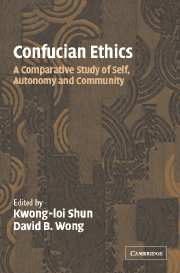Book contents
- Frontmatter
- Contents
- Contributors
- Contributors
- Introduction
- SECTION I RIGHTS AND COMMUNITY
- 1 Are Individual Rights Necessary? A Confucian Perspective
- 2 Rights and Community in Confucianism
- 3 Whose Democracy? Which Rights? A Confucian Critique of Modern Western Liberalism
- 4 The Normative Impact of Comparative Ethics: Human Rights
- SECTION II SELF AND SELF-CULTIVATION
- SECTION III COMMENTS
- Glossary of Chinese Terms
- Index
4 - The Normative Impact of Comparative Ethics: Human Rights
Published online by Cambridge University Press: 08 December 2009
- Frontmatter
- Contents
- Contributors
- Contributors
- Introduction
- SECTION I RIGHTS AND COMMUNITY
- 1 Are Individual Rights Necessary? A Confucian Perspective
- 2 Rights and Community in Confucianism
- 3 Whose Democracy? Which Rights? A Confucian Critique of Modern Western Liberalism
- 4 The Normative Impact of Comparative Ethics: Human Rights
- SECTION II SELF AND SELF-CULTIVATION
- SECTION III COMMENTS
- Glossary of Chinese Terms
- Index
Summary
In this chapter, I address human rights as an illustration of the role of comparative ethics in normative reasoning. In Section I, I distinguish comparative ethics from related intellectual enterprises inside and outside philosophy and discuss the difficulties of a comparative conception of morality. In Section II, I argue that the normative relevance of comparative studies is subtle and indirect. It flows out of three conditions of normative respect. I argue that these apply in the case of a Chinese–Western comparison but do not warrant treating all traditions as equals. These conditions underlie the appeal of a “synthesis of East and West” and illustrate the limited normative relevance of comparative ethics. I argue that any envisioned synthesis must come from continued moral discourse within the distinct normative traditions themselves. Comparativists may inform the traditions about each other and thus stimulate moral discourse but may not otherwise “guide” or adjudicate the shape of the final synthesis. In Section III, I apply the methodology to some forms of the argument that human rights do not apply to China. Then in Section IV, I briefly develop why comparative arguments purporting to justify excepting China from the realm of human rights subvert their own role by undermining or ignoring the crucial conditions of normative respect.
INTRODUCTION: COMPARATIVE ETHICS AND CHINESE PHILOSOPHY
We distinguish comparative ethics from anthropology or history on broadly normative grounds. It addresses philosophical “value.” Anthropology, by contrast, would normally address actual patterns of behavior or a description of “ordinary” attitudes.
- Type
- Chapter
- Information
- Confucian EthicsA Comparative Study of Self, Autonomy, and Community, pp. 72 - 100Publisher: Cambridge University PressPrint publication year: 2004
- 4
- Cited by



